Project Management vs Product Management
In today’s ever-changing dynamic business environment, it is imperative that you define and manage your strategies to drive your business goals. Organizations execute projects that drive their internal goals and at the same time satisfy their client’s expectations or needs. Organizations can also develop products that solve a customer’s problem. Product Management vs Project management: these two terms refer to different but interrelated disciplines. As their name indicates, the project manager is responsible for project management while the product manager is responsible for product management. Simply put,
Table of Contents
- A project manager is an individual who handles the whole project work from initiation to completion. He/She focuses on the approved plans and manages resources and funds to achieve the project objectives.
- A product manager, on the other hand, manages the development process of products. He/She makes decisions regarding what will be built and how by focusing on the customer’s requirements, business objectives, and outcomes.
For a better understanding, let’s clarify the Project and the Product terms.
Product
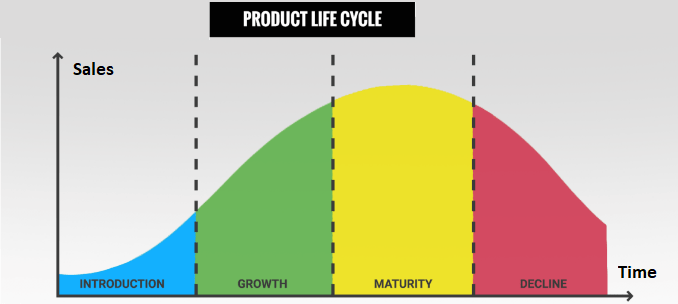
A product is something that can solve a customer’s need or a problem. All the product goes through a lifecycle such as introducing or launching it in the market, the growth phase, maturity stage, and decline. Examples for products include Facebook, Instagram, Twitter, etc.
Project
A project, unlike a product, is a temporary endeavor undertaken to create a product or service. The project has a clear definition of the scope and the timeline by which the service or product needs to meet. Projects like products follow a lifecycle like analysis, design, development, testing, implementation, and maintenance. These lifecycles can be present in any product lifecycle meaning project lifecycle can be present inside each of the product life cycles and in fact, multiple project lifecycles can occur inside product life cycles.
Product Manager vs Project Manager
A lot of people mix up the roles and responsibilities of project managers and product managers because they sound quite similar. However, their responsibilities are different.
Project Manager vs Product Manager
- Project managers are responsible for quality control, resource allocation, budget planning, health and safety requirements, etc. They play an essential role in making all the things happen required to complete the project successfully.
- Product managers coordinate team building, creates and maintains the product roadmap, and develop the strategic plan in order to meet the customers’ requirements and the business’s goals.
On the other hand, these two roles have some similarities such as interfacing with stakeholders and communicating with various groups. Also, their acronym is the same which is “PM” for both of them.
Product Management Software vs Project Management Software
In today’s business environment, projects are more sophisticated and products have more features than before. Therefore, using a software tool is inevitable to manage complicated and overlapping tasks. A product management software is designed to plan and manage the life cycle of the product while a project management software is used to track the project tasks through the life cycle of a project.
A product management software typically has its own characteristics, which are used to translate the product development strategy into manageable tasks. A project management software can be used along with the product management software to involve all steps of a project as well as involving the product management step.
Product Management and Project Management
Product and Project have subtle differences as mostly the internal workings are the same but yet they are distinct. Let’s understand the difference between a product and a project in detail to get some clarity.
Projects are typically managed through the triple constraints like Scope, Cost, and Timeline in traditional waterfall methodology where all these constraints are fixed. In agile methodology, the Cost and Timeline constraints are fixed and Scope is kept as a variable to welcome changes by the customer at any point in the development phase.
The reason is while dealing with a product, the end goal or vision is difficult to visualize as the product will stay and evolve in the market.
Though the Product has a vision defined by the business, the details often evolve changing the goal altogether. For example, Burbn was an app developed by Systrom to have users check-in at particular locations and earn points but later found to be that users were sharing pictures with their friends largely. The app was later renamed Instagram.
Product Scope vs Project Scope
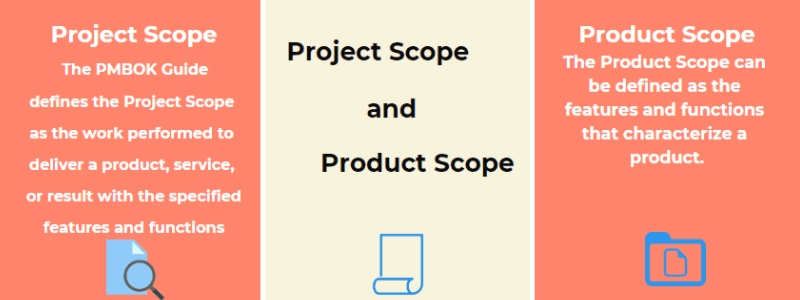
The Product scope defines the features, characteristics, and functions of a product. It includes technical specifications to describe what the product will look like. For instance, you decide to buy a new smartphone which is the product. Its scope defines the memory, capacity, color, screen resolution, etc.
The product scope defines the effort to be performed to deliver a product, service according to its specifications. It includes all the tasks to be completed. Therefore, the product scope can be covered in the project scope.
Product Life Cycle vs Project Life Cycle
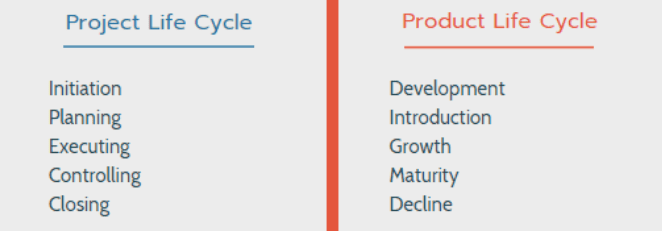
The Project Life Cycle has the following five phases;
- Initiation
- Planning
- Executing
- Controlling
- Closing
The Product Life Cycle has the following five phases;
- Development
- Introduction
- Growth
- Maturity
- Decline
As you see, the product life cycle phases are completely different than the project life cycle phases. The project life cycle phases are often overlapping where the product life cycle phases are non-overlapping.
Roles and Responsibilities of Project Managers and Product Managers
Product Managers
Product management is an internal function of an organization dealing with developing, marketing, forecasting, and promoting the products that it develops. Project management, on the other hand, is the defined sets of processes through which it delivers/develops products or services.
Product Managers sometimes called Product Owners own the responsibility for the success of the product through outs its lifecycle. Product owner always aims at providing directions on what is needed from the product rather than how it should be developed. The product managers should be a domain expert to understand the long-term view based on how the product will be used in the market and also define its trajectory.
The product managers responsibility will include but not limited to,
- Maximizing the ROI of the product
- Charting product vision and roadmap
- Provide directions on “what” part of the product
- Define priorities of features to be developed in each release
- Working with sales and marketing team to define success strategies of the product.
Overall, the product manager is the single responsible for either success or failure of the project.
A project manager is responsible for the successful delivery of a project or service by meeting the defined timelines and budget. Project managers oversee the development of products to ensure it meets the requirements by managing the risks and issues. Project managers define the “How” part of the product development lifecycle.
Project Managers
A project manager’s primary responsibility would be managing the project by managing the constraints defined above and deliver with the quality standards defined by the client or product manager. Project managers move from one project to another project as soon as the project ends but the product manager continues a little longer than a project manager as the product life cycle extends beyond the project life cycle. i.e. the product manager moves on to a different product during the decline phase of the existing product or once its goal is met.
Responsibilities of project managers include but not limited to,
- Build a product
- Manage a team to develop the product within the timeline and budget
- Manage the constraints (scope, time, and cost)
- Meet the quality standards
- Manage risk and issues while developing the product
Conclusion
Product and project management concepts are interleaved as you have read above but they are distinct always. Main difference between Project Manager vs Product Manager is that Project managers focus internally and have specific and defined goals while working on a project while product managers focus externally have broader sets of goals as the product will evolve.
Although you can have a single person take on product and project management roles, it is always best to have these two roles separate to avoid conflict of interest.
How does your organization view the product and project management roles? Have you faced any difficulties in differentiating these two roles in the past?
Further Reading
Ramkumar Arumugam is working as a Sr. Program Manager with 15+ years of success in leading all phases of diverse technology IT Projects in retail, e-commerce, insurance and pharma market research industries. He is a regular contributor to projectcubicle.com

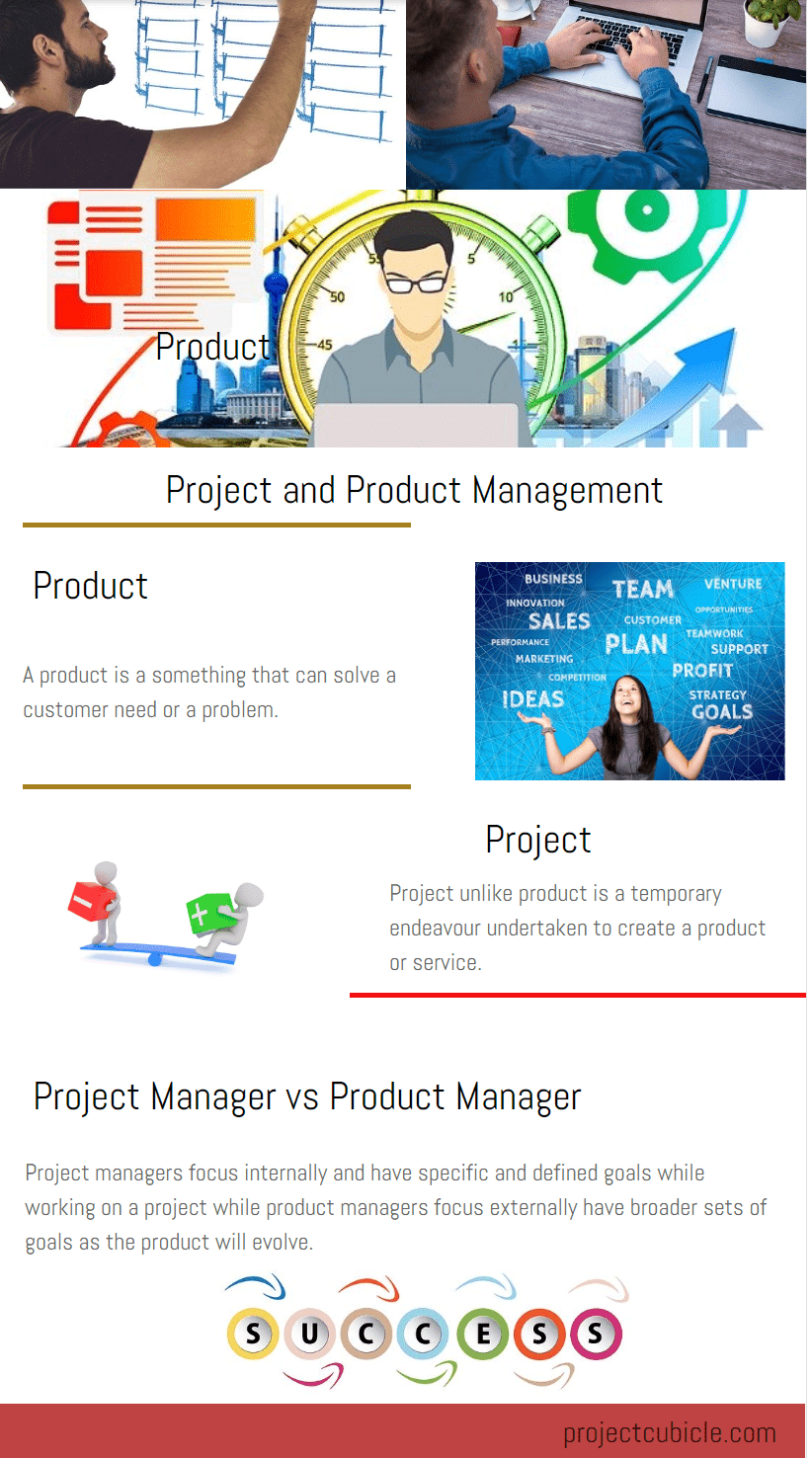

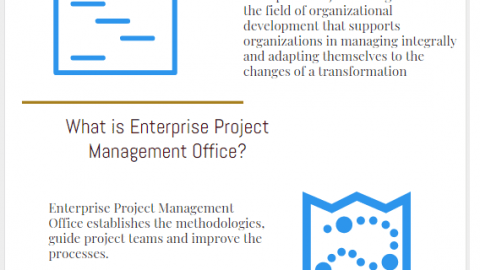
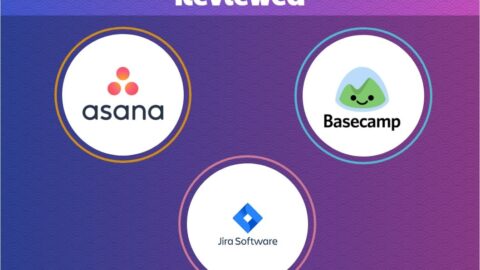
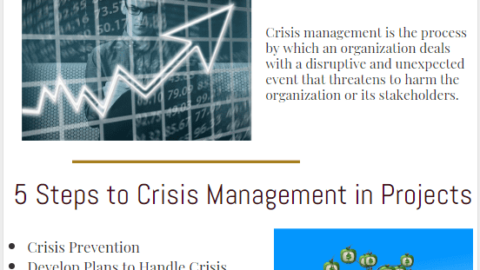


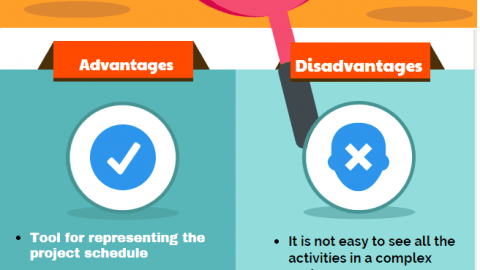
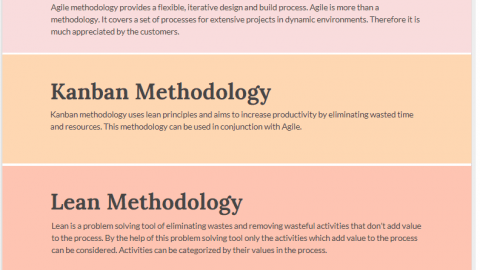

These two terms may seem to be the same thing, they are actually not as we read in this article.
Project Management and Product Management is important as much as production, we should be careful about they